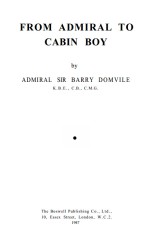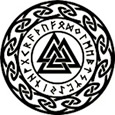
Author : Domvile Barry Edward
Title : From admiral to cabin boy
Year : 1947
Link download : Domvile_Barry_Edward_-_From_admiral_to_cabin_boy.zip
Barry Edward Domvile, son of the late Admiral Sir Compton Edward Domvile, G.C.B. , G.C.V.O., started a brilliant career brilliantly. Born in 1878, in 1892 he passed first into H.M.S. Britannia, and, two years later emerged in the same coveted position. From 1894 to 1897 he served as a Midshipman under sail and steam. Sub-Lieutenant in 1898, he became, by special promotion, Lieutenant in the same year. Lieutenant and Gunnery-Lieutenant from 1898 to 1909, in 1906 he was awarded the Gold Medal of the Royal United Service Institution. During 1910 and 1911, Domvile was in command of destroyers, and, when the first World War loomed on the horizon, was appointed Assistant Secretary to the Committee of Imperial Defence during war preparation. Throughout hostilities he commanded successively " Miranda, " "Tipperary," "Lightfoot," "Arethusa," "Carysfort," "Centaur" and "Curacao" — destroyers, flotilla leaders and cruisers of the Harwich Force. For the three years preceding 1919, he served as Flag Captain to Admiral Sir Reginald Tyrwhitt. For the following three years he was employed as Assistant Director and Director of the Plans (Policy) Division of the Admiralty Naval Staff, attending a number of conferences, including those at Paris, Brussels, Spa and San Remo, winding up with the Washington Naval Conference. From 1922 to 1925, he was Chief of Staff to Admiral Sir Osmond Brock, of the Mediterranean Fleet, and during 1925 and 1926 commanded the "Royal Sovereign," which has now been handed to the Soviet Union. In 1927 he was promoted Rear-Admiral and up to 1930 held the important position of Director of Naval Intelligence. During 1930 and 1931, first as Rear-Admiral and then as Vice-Admiral, he commanded the Third Cruiser Squadron, Mediterranean Fleet. From 1932 to 1934 he was President of the Royal Naval College, Greenwich, and Vice-Admiral Commanding the War College. In 1936 he retired with the rank of Admiral. In 1917, Captain Domvile was created a Companion of the Most Distinguished Order of St. Michael and St. George, and in 1922, as Commodore, a Companion of the Most Honourable Order of the Bath. Finally, in 1934, His Majesty King George V was pleased to honour him further by creating him a Knight Commander of the Most Excellent Order of the British Empire. This was the record our misguided rulers saw fit to impugn. In 1940 the Home Secretary, Sir John Anderson, vainly attempted to abort this magnificent career by appointing the Admiral cabin boy at Brixton Prison: Anderson was succeeded shortly afterwards by Morrison, who at one time could be classed as a conscientious objector, and was author of an article taunting British soldiers and urging them not to fight for their country, but the Admiral held his position for three years, acquitting himself in his customary exemplary manner, save for a little lapse which took the form of manufacturing a stove, contrary to regulations, of an old tobacco tin, a lump of margarine and a piece of string. Nothing could excuse delaying the reader from embarking upon this exciting and extraordinary story. He w i ll find himself buffeted exhilaratingly upon the high seas of every human emotion before he reaches the port of his own judgment. Sir Barry Domvile is fortunate in one sense: he will not have to wait, as so many men who have suffered injustice have had to do, for the verdict of history to complete his vindication. Each successive year, like the one that has just passed, will provide fresh proof of his wisdom and foresight. Yet, since this must inevitably bring suffering to his fellow-countrymen, the Admiral, in his patriotism and the greatness of his heart, will be the first to deplore the fact. In appraising him, the words of Horace rise readily to the mind: "The just man, firm to his purpose, is not to be shaken from his fixed resolve by the fury of a mob laying upon him their impious behests, nor by the frown of a threatening tyrant, nor by the dangers of the restless Adriatic, when the stormy winds do blow, nor by the loud peals of thunder as they rend the sky; even if the universe were to fall in pieces around, the ruins would strike him undismayed." CUTHBERT REAVELY. ...

Tourney Phillip - What I saw that day
Authors : Tourney Phillip F. - Glenn Mark Title : What I saw that day Year : 2011 Link download :...














